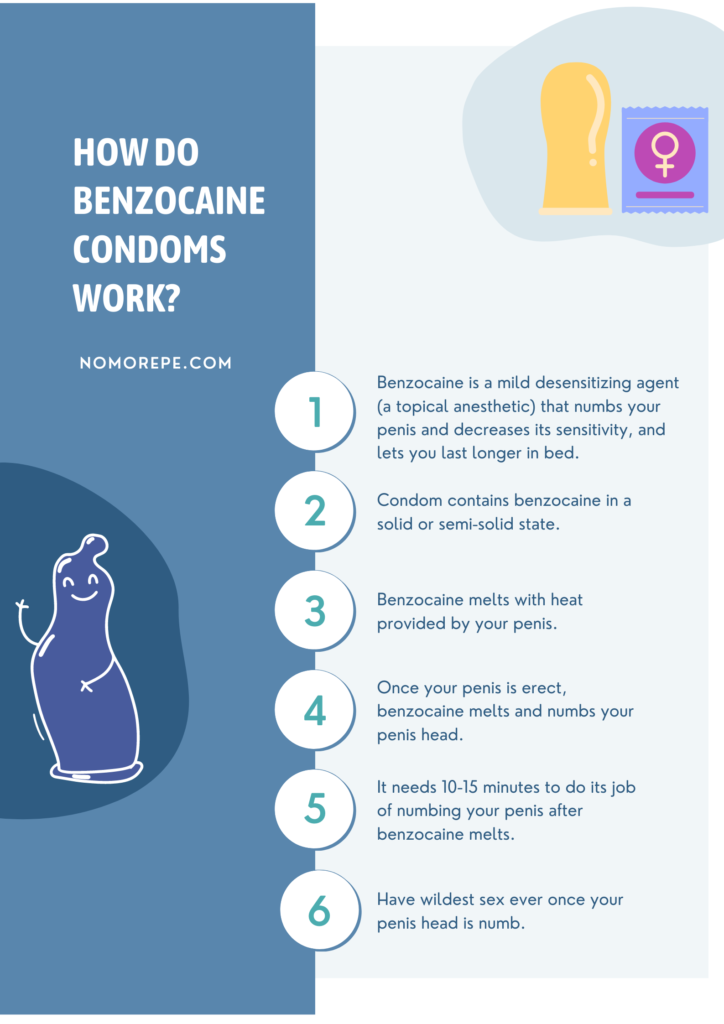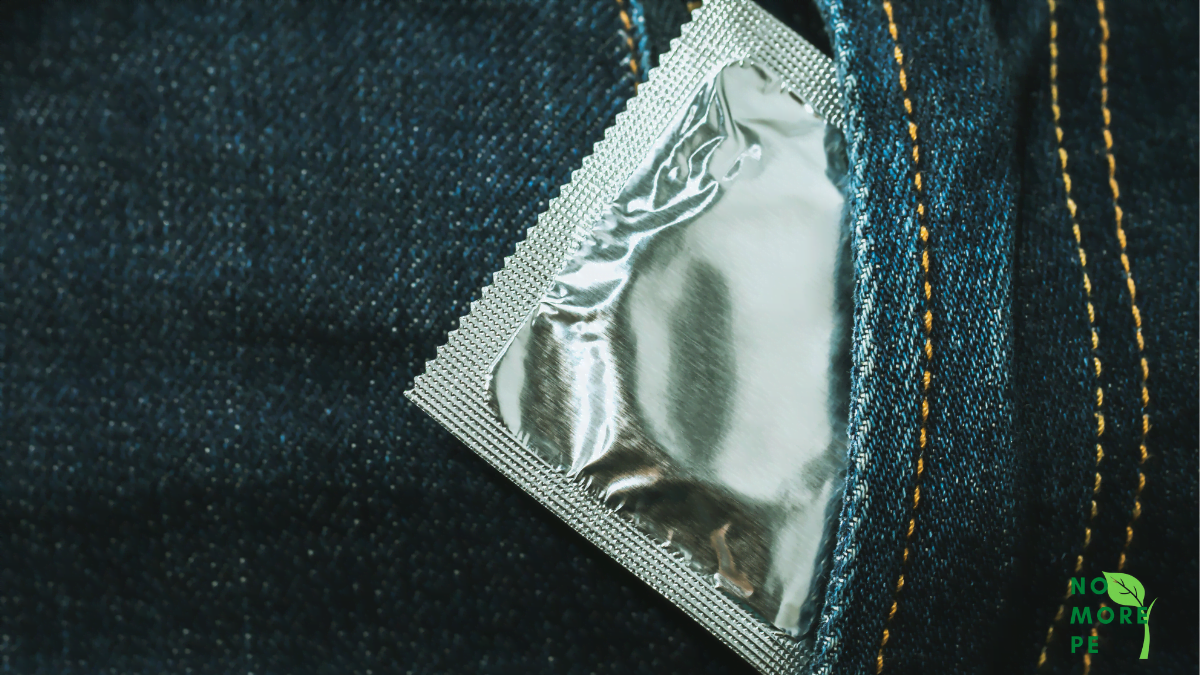Delay condoms are a nice way to last longer in bed by delaying ejaculation. They offer an effective premature ejaculation (PE) treatment than most of the other desensitizing products for their ease of use and being mess-free.
Lidocaine and benzocaine are the two most used local anesthetics that are found in most of the popular delay products. How do you choose between lidocaine vs benzocaine condoms? And are lidocaine condoms better than benzocaine condoms?
Benzocaine condoms are better than lidocaine condoms and you should always go with benzocaine condoms.
Why?
They are safe, easy to buy, follow FDA guidelines for male genital desensitizers, and are best for delaying orgasm.
What’s wrong with lidocaine condoms and why don’t you find them in the market?
Keep reading to find out…
Table of Contents
What is Lidocaine?
Lidocaine or lignocaine is a local anesthetic used for treating pain, minor burns and scrapes, insect bites, and numbness during minor surgical procedures. As a topical anesthetic, it is used in several medications such as topical sprays for numbing skin. It is available in different forms including sprays, creams, and gels.
Lidocaine Uses
- It is used to treat skin burns and scrapes
- Treats insect bites
- Used as a pain reliever and muscle relaxer
- Minor cuts and burns
- Used to numb skin and reduce pain during tattoos and piercings
- Treats eczema
- Ease issues in genitals such as anal fissures
- Used in male genital desensitizer sprays for climax control.
Can Lidocaine be Used with Condoms?
No, lidocaine can’t be used conveniently with condoms. Lidocaine doesn’t go with latex and it ruins latex when both stay in contact for a longer duration. The latex corrodes when it stays in contact with lidocaine.
This is a reason why lidocaine is rarely used with latex condoms.
For example, Pasante sells lidocaine condoms known as Infinity Delay that contain 1% lidocaine. So, lidocaine condoms do exist and you can use them, but they aren’t too common.
The FDA has approved lidocaine for use in delay sprays only for the treatment of premature ejaculation. While you can buy lidocaine condoms in the US as over-the-counter products aren’t reviewed by the FDA, all such condoms are against FDA guidelines for male genital desensitizers as covered here.
Lidocaine Condoms Safety
Lidocaine condoms are safe to use as long as the condom is intact. Make sure the condom isn’t corroded as lidocaine is more likely to corrode it. Also, keep an eye on its expiry date and shelf life. Latex condoms with lidocaine have shorter shelf life and expiry.
Generally, lidocaine is safe to use and has no serious side effects as long as you don’t overuse it. Excessive use of lidocaine is lethal but condoms don’t have a high concentration of lidocaine and you can’t use more than a single condom at a time, so there is no safety threat associated with lidocaine condoms.
Lidocaine, however, has common side effects that you might experience irrespective of its concentration:
- Skin itching, rash, and redness
- Dizziness
- Fever
- Nausea and vomiting
- Dizziness
- Headache
- Blurred vision
- Breathing issues
- Lung disorder
- Seizure.
The side effects aren’t common. Most men who use lidocaine condoms don’t experience any side effects at all.
What is Benzocaine?
Benzocaine is a local anesthetic used for several medicinal purposes including pain relief, skin issues, surgeries, and numbing skin. It works like lidocaine or any other local anesthetic by blocking sodium channels where it is applied resulting in reduced sensitivity.
It is mainly used as a topical anesthetic for dental purposes, premature ejaculation, and to numb skin during minor surgical treatments.
Benzocaine Uses
- It is used for skin burns and scrapes
- Sunburn
- Minor cuts
- Insect bites
- Treats dental pain
- Sore throat
- Mouth and gum injuries
- It is used in desensitizer products to treat premature ejaculation.
How Benzocaine Condoms Work?

Most delay condoms have benzocaine inside the condom’s tip in semi-solid form. It gets activated with human body heat so as soon as you wear a condom, the heat from your penis melts benzocaine almost instantly.
Benzocaine activates when it melts. And once it is activated, it needs 5 minutes (tops) to reduce the sensation. You can feel slight numbness almost immediately when you are aroused and have a condom on.
Benzocaine reduces the sensitivity of your penis head because that’s where benzocaine is placed inside the condom. With a reduction in sensitivity, you can last longer during sexual intercourse.
Technically, benzocaine works by blocking sodium channels from reaching your brain. The signals from the penis fail to reach your brain as they are blocked by benzocaine so your brain doesn’t know what’s happening down there. It stays uninformed. And it doesn’t know if you are stimulated or not. This delays the ejaculatory reflex which is your brain’s natural response to stimulation and arousal.
So, benzocaine delays your ejaculatory reflex by interrupting signals that inform the brain to kick in the ejaculatory reflex in response to sexual stimulation.
Benzocaine condoms are quite common and used extensively. Companies like Durex and Trojan manufacture and sell benzocaine condoms. Unlike lidocaine, benzocaine doesn’t react to latex and it is also milder than lidocaine, so it is safe to use with latex condoms.
The FDA has approved benzocaine for use in condoms with a maximum concentration of 7.5%. This is another reason why benzocaine condoms are readily available in the market.
Benzocaine Condoms Benefits
- Benzocaine condoms are safe to use
- Approved by the FDA as a treatment for premature ejaculation
- Help you last longer in bed and enjoy sex for longer
- Work instantly within 5 to 15 minutes
- No mess. Easy to use
- No major side effects
- Easy to carry and pocket-friendly
- No prescription needed
- A lot of options to choose from.
Benzocaine Condoms Safety
Benzocaine condoms have no major side effects. The common side effects (inherited from benzocaine) include:
- Skin itching, burning, stinging, rash, and redness
- Dryness and white flakes
- Headache
- Dizziness
- Fever
- Muscle pain and fatigue
- Difficulty in breathing
- Body ache
- Inflammation.
These are rare side effects that occur in 1 out of 1,000 to 10,000 men who use benzocaine condoms. Most men feel slight itching on their penis after use which goes away after some time.
Lidocaine Vs Benzocaine Condoms
1. Availability
Lidocaine condoms aren’t available and hard to find while benzocaine condoms are readily available.
It is hard to buy lidocaine condoms in the US and other parts of the world for two main reasons:
- The FDA in the US does not allow lidocaine to be used with delay condoms
- Lidocaine does not go well with latex (most condoms are made of latex) as it decomposes latex and ruins its strength and flexibility.
This makes it exceptionally hard to find and buy a lidocaine condom especially if you are in the US.
Benzocaine condoms are readily available from top brands like Durex. The FDA has approved and allowed benzocaine for use in condoms for delaying orgasm and for the treatment of premature ejaculation.
And benzocaine doesn’t corrode latex and works exceptionally well with it making it an ideal local anesthetic for delaying condoms.
In reality, you can only buy benzocaine condoms and might not find lidocaine condoms at all.
2. Safety
Benzocaine condoms are safer and light on the skin as compared to lidocaine condoms.
Lidocaine has more severe side effects than benzocaine making it less safe. Excessive use of topical lidocaine is lethal and it can cause seizure and in rare cases, death. This is because it reduces oxygen levels in your blood making it hard for your cells and tissues to get necessary oxygen.
Benzocaine condoms are safer and have mild side effects. This is primarily because benzocaine is a mild anesthetic with less severe side effects.
Benzocaine condoms are also safe because benzocaine doesn’t react with latex and it does not corrode it. The strength and quality of the condom remain intact even when you store it for months.
3. Effectiveness
Lidocaine condoms aren’t as effective in the long run as benzocaine condoms.
Lidocaine condoms lose their strength and firmness over time as lidocaine reacts with latex and ruins it. Other types of condoms such as polyurethane and polyisoprene might be safer and more effective, but since most of the condoms are made from latex rubber, they aren’t too effective.
Lidocaine, however, is quite a strong local anesthetic and it is more powerful than benzocaine. The issue with lidocaine condoms is that they lose their strength over time.
Benzocaine condoms are highly effective in two ways:
- Benzocaine does not react with latex and it does not, therefore, corrode and deteriorate the condom
- Benzocaine is quite an effective anesthetic and its absorption capability increases significantly when it is heated (which is provided by your penis).
Benzocaine condoms are more effective than lidocaine condoms.
FAQs
Is Benzocaine Safe for Condoms?
Yes, benzocaine is safe for condoms. Benzocaine condoms are used by men to last longer in bed and the FDA has allowed benzocaine condoms for the treatment of premature ejaculation. You can use benzocaine with your condoms without any issues.
Is Lidocaine Better than Benzocaine?
Lidocaine is better than benzocaine in terms of strength and effectiveness. What 5% lidocaine does for you, it will be done by 20% benzocaine (based on this study), but with fewer and less severe side effects. Lidocaine is only better than benzocaine in terms of its concentration.
What Does Lidocaine Do to Condoms?
Lidocaine corrodes condoms. This is a reason why lidocaine condoms are hard to find and most brands use benzocaine in delay condoms. The corrosion caused by lidocaine in the condom deteriorates the condom and it loses its strength.
Is Durex Benzocaine Safe?
Yes, Durex benzocaine condoms are safe. The common, minor side effects include skin rash, itching, and burning. It goes away after some time. There is no harm in using Durex benzocaine condoms.
Is Benzocaine or Lidocaine Better for Condoms?
Benzocaine is better for condoms without a question.
Benzocaine is safe, mild, light on your penis, has less severe side effects, and it works with latex without any issues. The best thing is that benzocaine melts with the heat of your penis and it significantly improves benzocaine’s absorption capability.
Lidocaine condoms are not available because lidocaine reacts with the condom and makes it weak. The condom loses its strength and effectiveness. Lidocaine isn’t approved by the FDA for use with premature ejaculation condoms.
This is a reason why benzocaine condoms are better and readily available from top brands like Durex.
Updated: August 17, 2023

